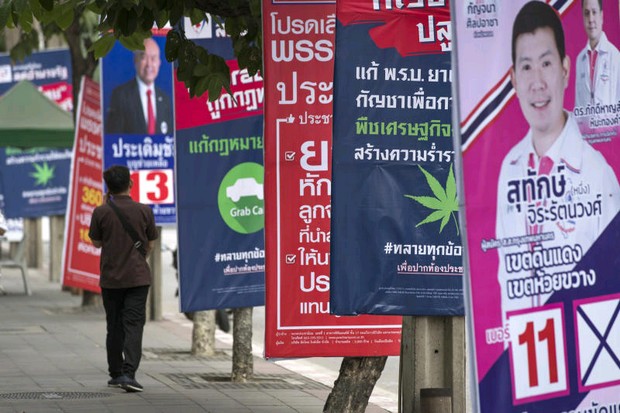
As the election campaign season moves into full swing after a nearly eight-year hiatus, many will see it as the same old tired routine of politicians smearing each other, slinging mud and squabbling all the way to the poll and beyond.
Placards and billboards promoting this and that candidate clutter urban sidewalks and upcountry intersections, while political parties make all sorts of promises to pamper and please voters. It all looks unruly and unwieldy; the basis of elected governments' loss of legitimacy and popularity in the past, which led to various military coups.

Thitinan Pongsudhirak teaches International Relations and directs the Institute of Security and International Studies at Chulalongkorn University.
Yet those who are already or will soon get sick and tired of what is known as Thailand's "gutter politics" of unsavoury politicians should take plenty of stock from the current and outgoing military government supervised by a military junta.
With elected representatives in parliament, at least there will be a measure of accountability and space for voicing dissent. Voters can openly criticise and deride politicians in ways they cannot do with self-appointed generals.
There will also be a parliamentary opposition, unlike the current rubber-stamp legislature appointed by the junta to legislate for its military government.
Despite Thailand's "money politics", where politicians have treated politics as the business of getting elected to recoup costs and make a windfall, there are qualitative signs of change.
For example, the new constitution has vested unprecedented authority to appointed agencies to check and curb political parties and politicians. New faces on the party scene and a few new policy ideas also augur well for a political system that might be different than the past because of the new reign.
In gauging the electoral scene, three types of parties and two policy directions have taken hold. The main parties can be divided into those who are in favour of the junta and the incumbent Prime Minister Prayut Chan-o-cha, and others who are against the military government and all that it stands for, with fence-sitting banners poised to go with whoever takes post-poll power.
The pro-junta camp features the Palang Pracharath party, whose name matches the coup-appointed government's policy platform, flanked by the Action Coalition of Thailand, under former Democrat Party secretary-general Suthep Thaugsuban, and the smallish People's Party, under Paiboon Nititawan, who has used Buddhist devotion as his platform.
The anti-junta parties are led by the Thaksin-aligned Pheu Thai, Thai Raksa Chart, Pheu Tham, and Pheu Chart. In addition, the up-and-coming Future Forward and the maverick Seri Ruam Thai parties stand against the coup and all that it has spawned.
The Democrat Party is not overtly in favour of the military government and Palang Pracharath but it has not ruled out joining a military-led coalition government after the poll. Other parties that can go either way include Bhumjaithai, Chart Thai Pattana, and Chart Pattana. Parties that are smaller than these might also get a party-list seat or two here and there because the constitution is stacked against larger parties.
Surprisingly, the most familiar parties this time are not proffering the most appealing policy platforms. Most policy pledges have been "populist" because they promise expenditures for the masses with scant mention of income generation.
While the Thaksin-aligned parties have promised to shore up agricultural prices, they have not homed in on specific policies, such as the 30-baht healthcare in 2001 and rice-pledging in the 2011 elections. Thai Raksa Chart, a party that faces potential dissolution, is running as a descendant of its original Thai Rak Thai Party, with the same slogan of "Think Anew, Act Anew".
The Chart Thai Pattana and Chart Pattana parties are campaigning on legacies of its past founders, patrons and prime ministers -- Banharn Silapa-archa for the former and Chatichai Choonhavan for the latter. These two smallish parties, like most of the other established banners, rely on veteran politicians and patron-client ties in traditional strongholds to send enough MPs to parliament to win a few cabinet portfolios.
Two parties that are starting relatively from scratch without established MPs are Future Forward and Seri Ruam Thai.
While most party platforms advertise how much money people are going to receive by electing them, Future Forward and Bhumjaithai are the two most visible that also discuss earning national income, not just how to spend it and what on.
Future Forward offers a wholesale restructuring of the state budget, shifting funds and recalibrating priorities, raising taxes and promoting small- and medium-sized companies at the expense of big business.
In particular, Future Forward intends to downsize the military and reduce its budget to spend elsewhere. This is a kind of party that Thai politics has not seen before. Its radical, welfare-minded and pro-business stance can be compared to the New Force Party from the mid-1970s, but that party did not have such a young and new generation of people to lead them.
Somewhat counter-intuitively because it relies on traditional patronage networks, Bhumjaithai offers the most striking and concrete platform so far. Many have noted its pledge to liberalise cannabis and make Thailand its global production hub. But this party has other income-generating policies that aim to liberalise state control over the economy and empower people to earn a better living, including legalising Grab taxi, online learning and reforming the fisheries sector.
These party dynamics bode well for a change of government away from military-authoritarian rule but the road ahead is a long and daunting one. Electoral politics and a more open political space in Thailand have too often led to disappointment and disillusion.
It might all happen like that again, and thus the lacklustre performance and authoritarian rule of the current government should be etched into the Thai long-term collective memory, repeated and recalled whenever we become fed up with the elected lot of leaders.
